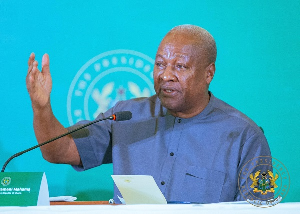Accra, May 3, GNA - Mr John Tia Akologu, Minister of Information, on Monday assured Ghanaians of government's commitment to passing the Information Bill into law and said an information law will encourage democratic participation in the national development process. He said: "The Right to Information represents an important instrument for the public to hold government and other actors accountable.while strengthening citizens' trust in those who govern." The Information Minister made this known at this year's celebration of World Press Freedom Day and Flag-Raising Ceremony by the Ghana Journalists Association (GJA) on the theme: "Freedom of Information: the Right to Know."
World Press Freedom Day is celebrated every May 3rd to remind government, inter-governmental and non-governmental organizations as well as civil society of the role a free press plays in strengthening democracy and fostering development around the world. Mr Akologu therefore urged the Ghanaian media to use the occasion for sober reflections about the issues of press freedom and professional ethics.
"President Mills' administration is convinced that a good Right to Information Law will be a critical tool that enhances media professionalism and ethical journalism, that ultimately will strengthen the role of the media in promoting transparency and accountability," he said.
He expressed the hope that when the bill is passed into law, it will inspire media practitioners to qualitative journalism and spur the media in Ghana to even greater heights that promote truth, good governance, freedom, justice, peace and democracy. Mr Ransford Tetteh, President of the GJA, said the Association religiously commemorates World Press Freedom Day because its ideals are in tune with Chapter 12 of the Ghanaian Constitution on the freedom and independence of the media. He said the GJA believes that a credible Freedom of Information Law and Broadcasting Law which takes cognisance of best practises in the world would compel the Ghanaian media to ensure quality in their education and information dissemination. Mr Tetteh therefore appealed to parliament not to rush into passing the Bill in its current state but to engage civil society a bit more on the issues to ensure that the law is in accord with international standards and helps promote transparency and accountability.
Mr Ismail Omer, who read a statement on behalf of Mr Ban Ki Moon, United Nations Secretary General, called on governments, civil society and all people around the world to recognize the important work of the media and to stand up for freedom of information. Adding his voice to the statement of the UN Secretary-General, Mr Omer said a strong and a free press was indispensable to people-centred development.
Mr Danaa Nantogmah, Programmes Coordinator of Friedrich Ebert Foundation, urged the public including the media to submit their concerns and proposals to Parliament for consideration before the bill is passed into law.
Professor Kwame Karikari, Executive Director of the Media Foundation for West Africa and a member of an advocacy committee for a broadcasting law, called on government to enact a broadcasting law in Ghana since it was necessary to maintain order on the airwaves. Mr Kabral Blay-Amihere, Chairman of the National Media Commission who chaired the function expressed concern about media standards and urged businesses to support media growth. The Private Newspaper Publishers Association of Ghana (PRINPAG), the Ghana Independent Broadcasters Association (GIBA), Network of Community Radio Stations, Institute of Public Relations, Ghana Broadcasting Corporation and the Coalition on Right to Information all in their solidarity messages expressed support for the bill to be passed into law.
General News of Monday, 3 May 2010
Source: GNA












